Different Types of Diamond Cuts Explained (With Meanings)
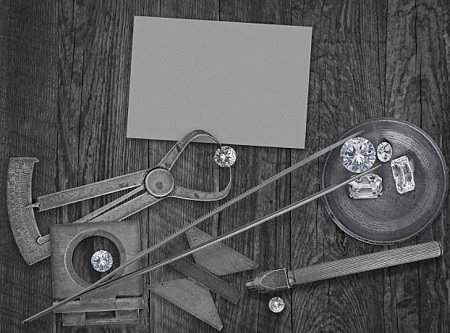
When it comes to buying engagement rings, I frequently get asked questions relating to the different types of diamond cuts in the market. But, what exactly is diamond cut? Is it the same as the shape?
Why does it matter, and how does it affect the quality of the stone?
We’ll answer these questions in this article and reveal bonus tips to shopping for a diamond ring the smart way. Let’s dive in…
What is Diamond Cut? Is it the Same as Shape?
Strictly speaking, they aren’t the same. However, most people in the industry often refer to diamond cut interchangeably as the following:
1. Proportions and finishing in which the rough diamond is polished and how well it sparkles.
2. A reference to its shape outline (e.g. heart, round, oval).
I know it’s a little confusing but depending on the context in which the term is used, it can mean different things. If someone was speaking about diamond cut quality or diamond cut grade/rating, it would typically mean scenario #1.
For a sparkly and brilliant diamond, the cut proportions and the way individual facets align together are key to its light performance. To find out indepth information, click here and here.
On the other hand, if someone says or phrases it along the lines of “type of diamond cut”. “diamond cut styles” or “diamond cut types”, they are usually referring to scenario #2.
And this is what we will be focusing on in today’s write up…
What Are the Most Popular Types of Diamond Cuts?
#1 – Round Brilliant Cut
Fashion trends often come and go but some styles can stay popular for a long period of time. The traditional round brilliant cut is a testament to this and has remained the most popular type of diamond cut since the twentieth century.
Due to the way the facet structure interacts with light, the round brilliant cut has remained a popular choice for good reasons. Besides better sparkle and scintillation patterning, round cut diamonds also complement various types of finger/hand shapes nicely.
Spectacular round diamond rings with ideal performance from WhiteFlash.com
#2 – Princess Cut Diamond
Besides the round diamond, other popular styles of diamond cut include the princess cut, oval cut and cushion cut. Coming in second place in terms of popularity is the princess cut which features a squarish appearance and offers a level of brilliance comparable to the round cut.
Interestingly, the princess cut diamond has the lowest price per carat compared to other shapes and gets you the “biggest bang” for your buck. This is because the cutting style makes very efficient use of the rough diamond during polishing and result in less material wastage.
High performance princess cut diamond rings from WhiteFlash.com
#3 – Cushion Cut
The cushion cut diamond has a pillow shape appearance with slightly rounded edges. This gives the shape a “softer” feel and comes across as a fusion between a square and round cut. It’s perfect for people who want a balance of sparkle and a unique look.
#4 – Oval Brilliant Cut
Oval diamonds look stylish and have gained traction in demand recent years. With a slightly elongated shape, an oval diamond ring also creates an illusion of longer and thinner fingers when worn.
Other Different Diamond Cuts Available in the Market
There are literally hundreds of styles and diamond cut types in existence. From incredible horse head shapes to extraordinary Buddha cuts, there are no limits to a cutter’s creativity and imagination.
However, I do want to focus a little more on the mainstream diamond cutting styles that are offered by typical jewelers. And if you had shopped around a little, you might have come across the following shapes: emerald, pear, radiant, asscher, marquise and heart.
#5 – Emerald Step Cut
Emerald cut diamonds have large open facets and are polished using a “step-cut” technique. Unlike a round diamond which has a sparkle signature like a disco ball, emerald cut diamonds display a hall of mirrors effect which gives it a distinctive appearance.
#6 – Pear Cut Diamond
Pear cut diamonds (also known as teardrop diamonds) are a popular type of diamond cut for pendants and drop earrings. When they are chosen for engagement rings, they are often eye catching and exhibit an aura of elegance.
#7 – Radiant Cut
The radiant cut diamond is a hybrid design that combines a rectangularish outline with trimmed corners. The signature patterning of the facets create a radiating light play that radiates from the center of the stone to the edges.
#8 – Asscher Step Cut
The Asscher diamond is a step cut with cropped corners that features a mesmerizing facet pattern. When seen in the face up view, the Asscher cut displays a scintillating maze of light play that draws your eye towards the center.
#9 – Marquise Cut
The marquise design has a football-like shape which makes for a bold fashion statement on your engagement ring. Like the oval diamond, the elongated shape accentuates the finger’s length and looks larger than other shapes of similar carat weights.
#10 – Heart Cut
Heart cut diamonds are a sight to behold and are the ultimate symbols of love. Quick trivia: the engagement ring I bought for my wife is a pave setting mounted with a heart shaped diamond. Well cut ones are extremely hard to shop for as it takes a lot of skill to cut them properly.
Tips to Selecting the Best Diamond Cut for Your Engagement Ring
With so many diamond cut shapes to choose from, how do you make a decision on which to buy? Well, here are some tips to help you out…
First of all, you need to find out what the preferences of the recipient are. Do they like the traditional round cut or something more uncommon like an oval cut? If you are unsure, you need to do some sleuthing work.
Have they ever indicated their likes/dislikes on Pinterest or Instagram? What kind of jewelry or accessories are they already wearing? Can you talk to their friends or relatives to find out more information?
Another factor to consider when selecting a diamond cut type is how the ring would look like on the fingers. The type of hands and finger sizes can complement some specific diamond shapes while others may just emphasize undesirable traits.
For example, women with shorter fingers would do well with elongated diamond cuts like the marquise or oval. If a wide band or a squarish diamond cut is chosen instead, the ring can make short fingers appear even shorter!
The comprehensive write up contains more information about guidelines to choosing rings for various finger types and hand sizes.
Besides the center stone, the other component which completes the engagement ring is the setting. You see, some diamond cuts can be better suited to certain style of settings while some can be a bad mismatch.
If you are shopping for a solitaire setting, its a “neutral” design that really goes well with any types of diamond cuts. On the other hand, if you are shopping for a 3 stone ring, asymmetrical shapes like heart or pear would not look good in a multi-stone ring.
Likewise, a princess cut diamond in a vintage style setting may look out of place compared to using an emerald cut diamond for the center stone instead.
Let’s Wrap Things Up!
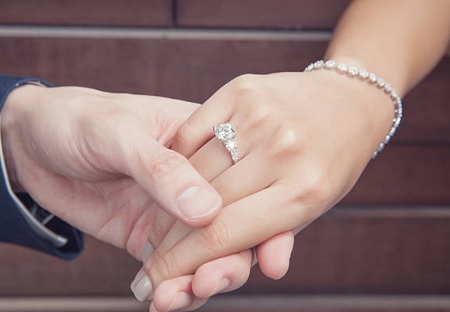
We’ve covered a lot; from the different cuts of diamonds to shopping tips to choosing a suitable shape for your engagement ring. I hope this article has been useful in addressing some of the questions you might have.
I would also love to hear from you. What kind of diamond cut would you buy and why? Leave a comment below to let me know!
On a final note, I know buying a diamond ring can be a nerve wrecking process for many people. The key to shopping with confidence is to do so based on making educated decisions with tangible data. And if you have any questions, feel free to get in touch with me and I’ll help you out.
Have fun shopping!
Related Articles
Leave A Comment

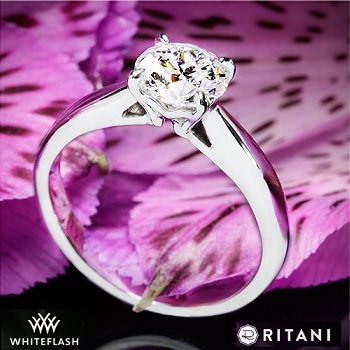
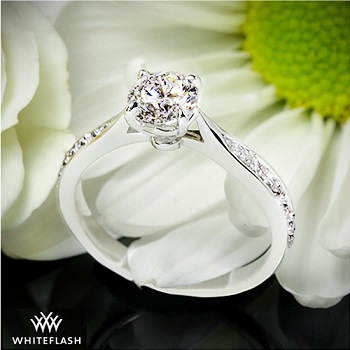
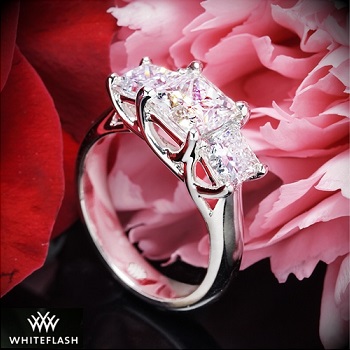
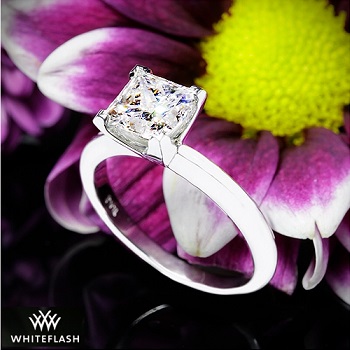
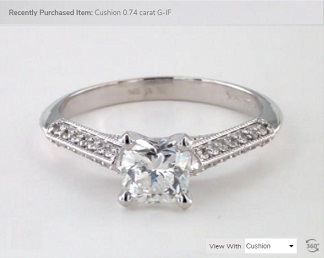
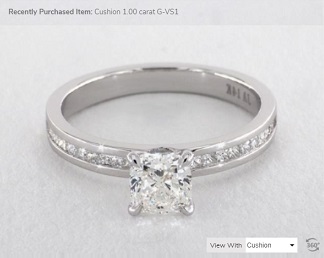
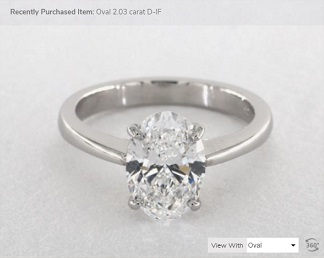
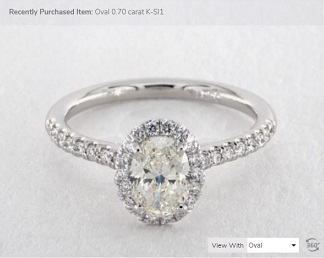
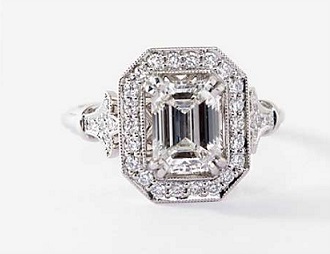
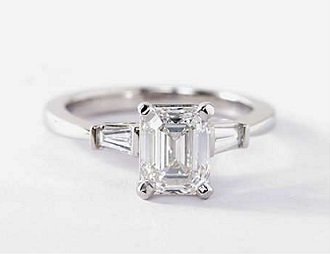
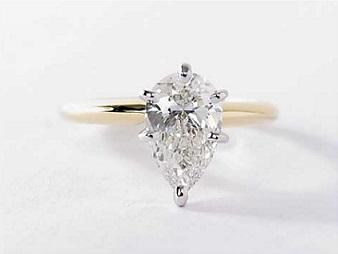
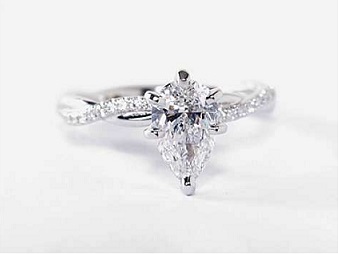
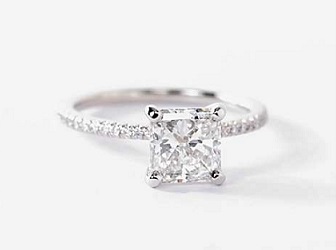
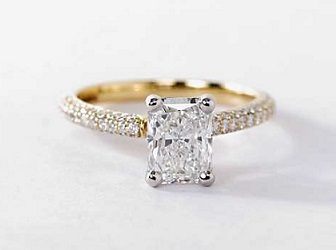
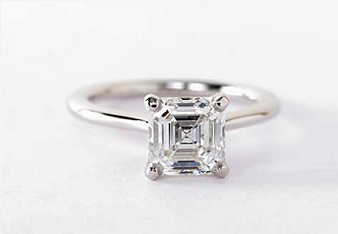
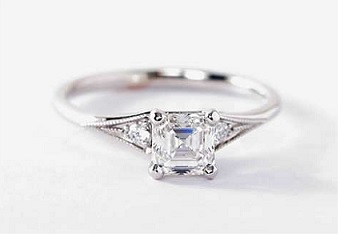
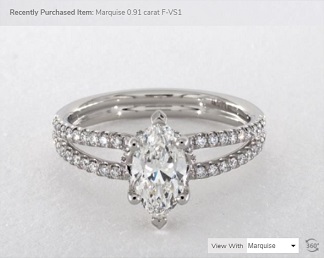
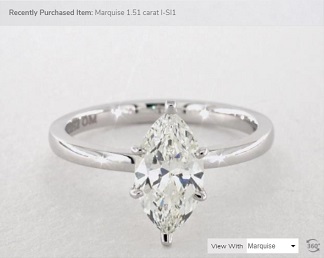
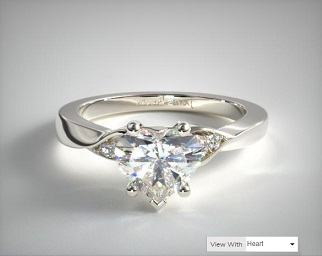
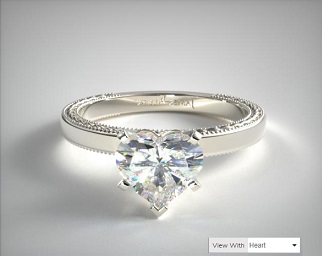
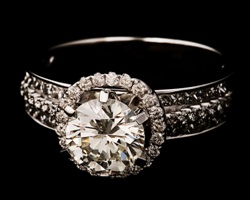

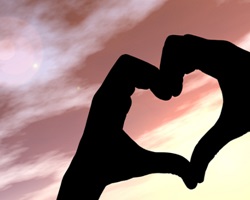
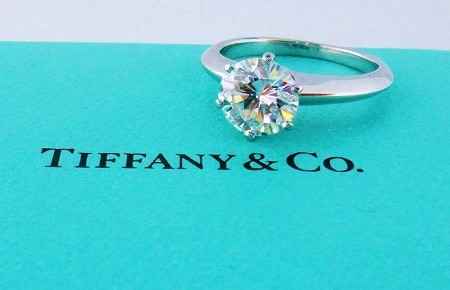






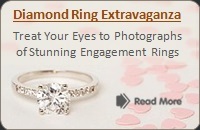
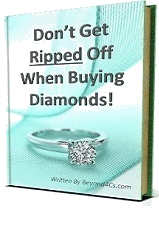

12 Comments
I’m looking for vintage diamond cut styles and want to buy a 1 carat ring for my girlfriend. I am having trouble finding information and sellers. Can you help?
For people who are seeking the traditional charm and elegance of the old world, you definitely want to check out the following vintage diamond cut styles; the old miner cut and old European cut.
Both of these dimond cuts display bold and chunky scintillation patterning which gives them their vintage flavor. Victor Canera is a jeweler who specializes in retro cuts of diamonds for rings and his signature line all have AGS ideal light performance. Also, he does a fine job at hand forging individual pieces of jewelry.
It’s very interesting that the names of different diamond cuts in the form of a round outline are so varied. I’ve looked at Blue Nile’s Astor and James Allen’s True Hearts. Are they fundamentally the same?
You are right in your observation. Both businesses actually curate ideally cut diamonds and label them with their trademark for branding purposes. Fundamentally, they are the same type of diamond cut and facet structure (57 facets). I would say that James Allen has stricter checks in place for better cut precision in most of their stones.
Which is the most expensive diamond cut in the world and also, which diamond cut sparkles the most? I’m interested in buying either a round cut and a cushion cut diamond but have yet to make up my mind.
Expensive is really relative in the world of diamonds. The bulk of cost in manufacturing a polished diamond lies in the amount of “wastage” in the rough stone. The kinds of diamond cuts that utilize most rough generally belong to a round shape or a variant of the round brilliant cutting style.
The yield on rough is typically lowest and that’s why they command higher price per carat.
Assuming that all else is equal, the type of diamond cut which offers the best sparkle is the 57 facet round cutting style. Cushion cuts will be a close second in my opinion and you can actually get more info about their differences here.
It’s not a coincidence that round brilliant cuts happen to be the most popular shape as well.
Thank you for the great content and information. I am working on a school project on jewelry designs and trends how many types of diamond cuts are there?
If you want to be comprehensive, there are tens to hundreds of diamon cuts in the history of the industry. It’s way beyond the scope of what we do here but there are a couple of article that touch on modern day creations and the types of round cut diamonds with better known brands.
https://beyond4cs.com/shapes/round/solasfera-vs-star-129/
https://beyond4cs.com/faq/diamond-brands/
I’ve also an article that goes into details about the best diamond cut for various jewelry purposes and personal preferences.
https://beyond4cs.com/shapes/best-diamond-cut/
Thank you for your work. I am sure it is very appreciated by clueless guys like me. I’m very stressed out by the purchase and I have only 2 weeks left to buy something nice. What are the different cuts of diamonds for princess shapes?
Are there special ones with better brilliance and sparkle? Tiffany claims theirs are better than any others. I’ve seen some in person and I admit they look nice to a lay person like myself. Any truth in this?
I know that embarking on the search for an engagement ring can be a very stressful and nerve wrecking process. After all, this is a once in a lifetime event and I’m sure nobody wants to screw up such an important purchase.
Most princess brilliant cut diamonds have between 3-5 chervons which determines how many facets they have (in a way). That said, the number of facets has no relation to the diamond’s performance and how it returns light. This is an aspect which requires interaction between all the facets on the whole.
White Flash and Brian Gavin are vendors you should check out as ideal cut princess are their forte. Tiffany’s diamonds are generally well cut but to label them as top notch? I would disagree. They sell decently cut diamonds at extremely high prices. What you are effectively paying for is their brand name and shopping experience.
Besides the 57 facets diamond cut style, have you heard or came across other round diamond cut types like the Solasfera or the Leo? Is one better over the other?
I do have experience with both types of round diamond cuts. You can read about my reviews on these cutting styles here:
https://beyond4cs.com/shapes/round/solasfera-vs-star-129/
https://beyond4cs.com/reviews/leo-diamond/
I won’t say that the Solasfera is necessary better over the traditional round as they both have different flavors to them and can look beautiful if they are polished to accurate proportions. The Leo is one that stands out both for its inconsistent nature in appearance (if you compared a few side by side, you will see different scintillation patternings) and often, unreliable grading reports. I would personally stay away from them unless there’s a symbolic reason to buy them.